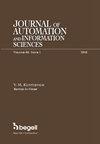ON THE UPPER AND LOWER RESOLVING FUNCTIONS IN GAME PROBLEMS OF DYNAMICS
Q3 Engineering
Journal of Automation and Information Sciences
Pub Date : 2021-11-01
DOI:10.34229/1028-0979-2021-6-3
引用次数: 0
Abstract
The quasi-linear conflict-controlled processes of general form are studied. The theme for investigation is the problem of the trajectories approaching a given cylindrical set. The research is based on the method of upper and lower resolving functions. The main attention is paid to the case when Pontryagin’s condition does not hold, moreover, the bodily part of the terminal set is non-convex. A scheme of the method is proposed, which allows, in the case of non-convexity of the body part, to fix some point in it, namely the aiming point, and to realize the process of approach. Sufficient conditions are obtained for solving the problem of approach for different classes of strategies. In so doing, the Hayek stroboscopic strategies that prescribe control by N.N. Krasovskii are applied. The process of approach goes on in two stages — active and passive. On the active stage the upper resolving function of second type is accumulated and after the moment of switching the lower resolving function of second type is used. These functions allow constructing a measurable control of second player on the basis of the theorems on measurable choice, in particular, the Filippov-Castaing theorem. The obtained results for generalized quasi-linear processes make it possible to encompass a wide range of functional-differential systems as well as the systems with fractional and partial derivatives. Possibilities for development of the offered technique are specified.论动力学博弈问题的上解函数和下解函数
研究了一般形式的拟线性冲突控制过程。研究的主题是轨迹接近给定圆柱集的问题。该研究基于上下分解函数的方法。主要关注的是当Pontryagin条件不成立时的情况,此外,端子集的身体部分是非凸的。提出了一种方法的方案,该方案允许在身体部位不凸的情况下,固定其中的某个点,即瞄准点,并实现逼近过程。得到了求解不同策略类的逼近问题的充分条件。在这样做的过程中,哈耶克频闪策略规定了由N.N.Krasovskii控制。方法的过程分为两个阶段——主动和被动。在有源级上,累积第二类型的上分辨率函数,并且在切换的时刻之后使用第二类型下分辨率函数。这些函数允许在关于可测量选择的定理,特别是Filippov Castaing定理的基础上构造第二参与者的可测量控制。所得到的广义拟线性过程的结果使得包含广泛的泛函微分系统以及具有分数导数和偏导数的系统成为可能。规定了开发所提供技术的可能性。
本文章由计算机程序翻译,如有差异,请以英文原文为准。
求助全文
约1分钟内获得全文
求助全文
来源期刊

Journal of Automation and Information Sciences
AUTOMATION & CONTROL SYSTEMS-
自引率
0.00%
发文量
0
审稿时长
6-12 weeks
期刊介绍:
This journal contains translations of papers from the Russian-language bimonthly "Mezhdunarodnyi nauchno-tekhnicheskiy zhurnal "Problemy upravleniya i informatiki". Subjects covered include information sciences such as pattern recognition, forecasting, identification and evaluation of complex systems, information security, fault diagnosis and reliability. In addition, the journal also deals with such automation subjects as adaptive, stochastic and optimal control, control and identification under uncertainty, robotics, and applications of user-friendly computers in management of economic, industrial, biological, and medical systems. The Journal of Automation and Information Sciences will appeal to professionals in control systems, communications, computers, engineering in biology and medicine, instrumentation and measurement, and those interested in the social implications of technology.
 求助内容:
求助内容: 应助结果提醒方式:
应助结果提醒方式:


